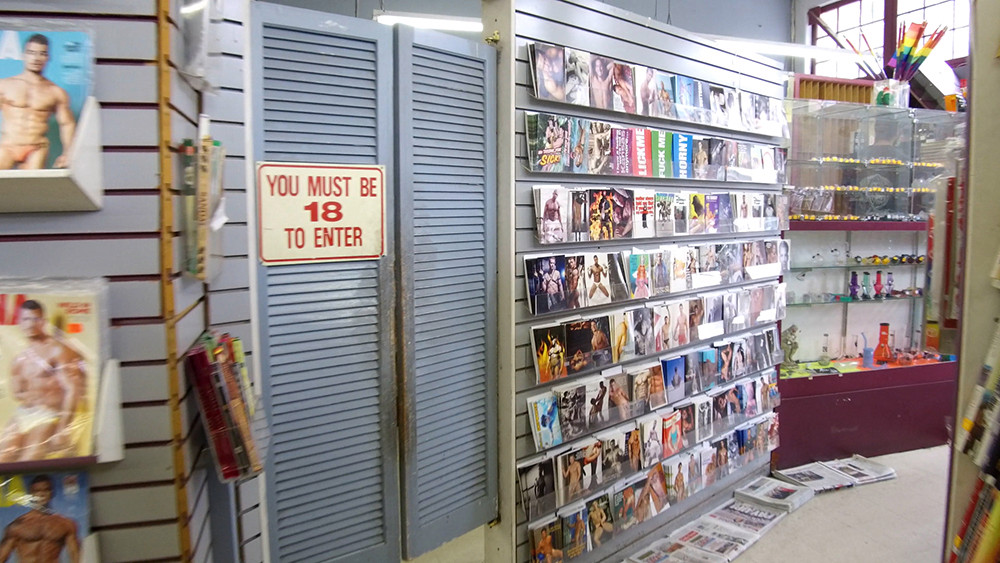[ad_1]
In a comic reversal of the usual roles, it’s the parents hiding the porn from their children in Circus of Books, the new documentary by artist, musician, and filmmaker Rachel Mason. The follow-up to her 2013 debut feature The Lives of Hamilton Fish—an experimental musical inspired by two historical contemporaries who shared the same name—Circus of Books, streaming on Netflix, offers a heartfelt and comparatively conventional portrait of Mason’s parents, Karen and Barry, and the titular pair of gay adult bookstores they ran in Los Angeles for over thirty years. Featuring extensive interviews with and footage of the Masons, their two sons (who, like their daughter, were kept in the dark throughout their childhood about the true nature of their parents’ business), their former employees, and various others, the documentary follows a familiar “rise and fall” arc: from the unlikely career change the couple embarked on as new parents to the bookstore’s meteoric success amid the AIDS epidemic and the Reagan administration’s crusade against pornography to, finally, its decline in the age of the internet.
The Mason family has more than enough psychosexual drama to fill the film’s eighty-six-minute running time. The imperturbably affable Barry takes his cues (sometimes quite literally) from the strong-willed Karen, a more complex and less consistently sympathetic figure. While Barry is not religious, Karen is a practicing Conservative Jew, and seems to have dealt with her shame about working in the adult industry by attempting to make her family as picture-perfect as possible. Their three children responded to this pressure in different ways: Micah, about whom we learn the least, says that the force of his mother’s expectations made him quiet; Rachel rebelled by becoming an artist and embracing all things countercultural; and Josh, who is gay, suffered from a textbook case of “Best Little Boy in the World” syndrome, sublimating his anxiety about his sexuality into academic and athletic achievement. When he came out to his parents in college—after several failed attempts—Karen told him, as she herself recalls in the film, that God must be punishing her.
Circus of Books is at its best when it lets itself be a film about the complicated character that is Karen Mason, a woman whose business acumen is matched by—and perhaps predicated on—profound self-delusion. Although it was Karen who suggested that Barry become a distributor of Larry Flynt’s Hustler magazine in the first place—a move that catalyzed their eventual entry into the world of gay porn—she displays a rather impressive amount of cognitive dissonance concerning their chosen profession, while Barry seems to have never had any qualms about it. Even when they expanded their business and began producing hardcore films of their own, Karen says, “It never felt like we were getting into pornography. We were just getting into a different business that was related to the business we were already in.” Besides, she protests (a bit too much), they never watched the movies they made.
The documentary has less to say about the community of which the Circus of Books stores were ostensible centers. Though the former employees make for an entertaining Greek chorus of talking heads, and there are a few fun stories about the bookstores’ (secondary?) function as cruising sites, most of the gay people in this film about gay bookstores are peripheral to the story of the nuclear family at its heart. While crafting a moving and quite watchable narrative, Circus of Books never really examines the delicate symbiosis between that family and the community whose patronage—and labor—supported them for decades.
The movie’s last act interweaves the final days of the original West Hollywood location in early 2019 (the other store, in Silverlake, closed in 2016) with Karen’s transformation decades earlier into a proud PFLAG parent who speaks at meetings and marches in the local Pride parade with Barry. While I found myself tearing up at Karen’s admission that “parents are only smart for a small window of time”—and moved by her dedication to helping others accept their LGBTQ children—the film, in its hurry to a half-happy ending, glosses over how, exactly, her transformation came to be, and doesn’t delve into how Karen squares her celebration of gay people with her continued discomfort with gay sex.
In the end, I found myself wanting Mason’s charming, well-composed film to probe a little deeper. Her dynamic with her mother never comes into focus the way Josh’s does, for instance, though it makes for some of the most compelling scenes—when out in the world, or at the store, Karen addresses her daughter behind the camera, usually to criticize or complain about Mason’s direction and occasionally to suggest she make her documentary about something else. (The movie opens with footage from a grainy home video in which a younger Karen tells her, “Rachel, this is going to be such a boring tape.”) These moments are compelling precisely because of how real and revealing they are, but the tension between Mason and the primary subject of her film, her mother, is never explicitly addressed (nor, notably, is Mason’s own queer identity or her relationship with a porn actor, Buck Angel). Early in the film, Karen, gesturing toward a wall of dildos at an adult novelty expo, remarks that she’s able to notice what would sell well at her bookstores without having to really look at it. That seems an equally fitting description of Mason’s approach to the questions her documentary brings up but leaves unanswered.
[ad_2]
Source link


